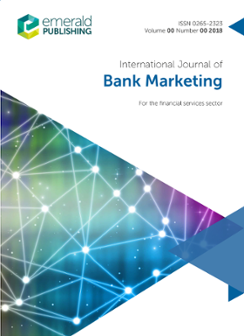The dark side of FinTech in financial services: a qualitative enquiry into FinTech developers’ perspective
IF 6.3
3区 管理学
Q1 BUSINESS
引用次数: 3
Abstract
Purpose FinTech offers numerous prospects for significant enhancements and fundamental changes in financial services. However, along with the myriad of benefits, it also has the potential to induce risks to individuals, organisations and society. This study focuses on understanding FinTech developers’ perspective of the dark side of FinTech.Design/methodology/approach This study conducted semi-structured interviews with 23 Nigerian FinTech developers using an exploratory, inductive methodology The data were transcribed and then thematically analysed using NVivo.Findings Three themes – customer vulnerability, technical inability and regulatory irresponsibility – arose from the thematic analysis. The poor existing technological infrastructure, data management challenges, limited access to data and smartphone adoption pose challenges to a speedy integration of FinTech in the country, making customers vulnerable. The lack of privacy control leads to ethical issues. The lack of skilled developers and the brain drain of good developers present additional obstacles to the development of FinTech in Nigeria.Research limitations/implications FinTech operation in a developing country differs from that in developed countries with better technological infrastructure and institutional acceptance. This study recognises that basic banking operations through FinTech are still not well adopted, necessitating the need to be more open-minded about the global practicalities of FinTech.Practical implications FinTech managers, banks and policymakers can ethically collect consumer data that can help influence customer credit decisions, product development and recommendations using the mobile app and transaction history. There should be strict penalties on FinTech for selling customers’ data, sending unsolicited messages or gaining unnecessary access to the customer’s contact list. FinTech can offer to educate consumers about their financial management skills.Originality/valueWhereas other studies have focused on the positive aspects of FinTech to understand client perceptions, this study offers new insights into the dark side of FinTech by analysing the viewpoints of FinTech developers. Furthermore, the study is based in Nigeria, an emerging economy adopting FinTech, adding a new dimension to the body of knowledge.金融科技在金融服务中的黑暗面:金融科技开发商视角的定性调查
Purpose FinTech为金融服务的重大改进和根本性变革提供了许多前景。然而,除了无数的好处外,它也有可能给个人、组织和社会带来风险。本研究的重点是理解金融科技开发商对金融科技黑暗面的看法。设计/方法/方法本研究采用探索性归纳方法对23名尼日利亚金融科技开发商进行了半结构化访谈。数据被转录,然后使用NVivo进行主题分析。研究结果三个主题——客户漏洞,技术上的无能和监管上的不负责任&源于主题分析。现有技术基础设施薄弱、数据管理挑战、数据访问受限以及智能手机的采用,对金融科技在该国的快速整合构成了挑战,使客户变得脆弱。缺乏隐私控制导致了道德问题。缺乏熟练的开发人员和优秀开发人员的人才流失为尼日利亚金融科技的发展带来了额外的障碍。研究限制/影响发展中国家的金融科技运营与技术基础设施和机构接受度更好的发达国家不同。这项研究认识到,通过金融科技进行的基本银行业务仍未得到很好的采用,因此需要对金融科技的全球实用性持更开放的态度。实际意义金融科技经理、银行和政策制定者可以合乎道德地收集消费者数据,帮助影响客户的信贷决策,使用移动应用程序和交易历史记录进行产品开发和推荐。对于出售客户数据、发送未经请求的信息或不必要地访问客户联系人列表的行为,金融科技公司应受到严厉处罚。金融科技可以为消费者提供金融管理技能方面的教育。独创性/价值尽管其他研究侧重于金融科技的积极方面,以了解客户的看法,但本研究通过分析金融科技开发商的观点,为金融科技的黑暗面提供了新的见解。此外,该研究以尼日利亚为基础,尼日利亚是一个采用金融科技的新兴经济体,为知识体系增加了一个新的维度。
本文章由计算机程序翻译,如有差异,请以英文原文为准。
求助全文
约1分钟内获得全文
求助全文
来源期刊

International Journal of Bank Marketing
BUSINESS-
CiteScore
10.70
自引率
18.90%
发文量
54
期刊介绍:
International Journal of Bank Marketing (IJBM) aims to publish papers that relate to the marketing challenges of financial services providers around the globe.
Preference is given to empirically-based research papers that expand on existing theories (or develop new ones) on customer behaviour in financial services settings.
In addition, the journal is interested in helping academicians and practitioners in the field to better understand the discipline of financial services marketing, and as a result review papers and thought pieces are invited for submission.
 求助内容:
求助内容: 应助结果提醒方式:
应助结果提醒方式:


